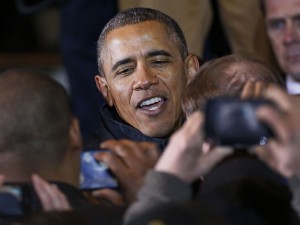‘New’ Obama tinkers rather than transforms

President Barack Obama works the crowd as he leaves after speaking at United States Steel’s Mon Valley Works in West Mifflin, Pennsylvania, Wednesday, Jan. 29, 2014, where he spoke about retirement policies he highlighted in the State of the Union address Hemmed in by Republicans, slowed by personal missteps and leaking inspiration after five rough years, the US president has embraced incrementalism. AP
WASHINGTON—Once he galvanized vast crowds with the cry: “Let’s go change the world!”
Now, if Barack Obama is still remolding the planet, he’s doing it in baby steps.
Hemmed in by Republicans, slowed by personal missteps and leaking inspiration after five rough years, the US president has embraced incrementalism.
Obama did unfurl a punchy, optimistic State of the Union address on Tuesday, billing the fight against income disparity as the defining project of the age.
But there was no multibillion-dollar program or a “moonshot” style challenge for 21st century Americans.
Article continues after this advertisementInstead, Obama offered modest, targeted plans using the power of his office to bypass Congress, which has let its own reforming muscle wither.
Article continues after this advertisementOnce, Obama vowed to slow the oceans’ rise and to mend Washington’s “broken politics.”
Now, he plots a way over the political mire—with “ladders” to give everyone a leg up on retirement savings, a decent wage, education and healthcare.
“What we are seeing is a different Barack Obama,” said William Rosenberg, a professor of political science at Drexel University, Philadelphia.
Obama powered into office on a wave of expectation and had the luck to follow a deeply unpopular predecessor in George W. Bush.
He exploited Democratic control of Congress to pile up the kind of legislative record that few recent presidents could boast—banning torture, saving the auto industry and passing big healthcare and Wall Street reforms.
But now, with power in Washington divided, the hope and change that defined him is largely in the past.
One example: Obama has spent years waxing lyrical on the need for immigration reform.
But on Tuesday, he trod carefully on the issue—his one potential second-term domestic legacy win—lest he spook conservatives agonizing whether to sign up.
On the other potential big ticket item — a nuclear deal with Iran — Obama was more firm, promising to veto any new sanctions he says could kill diplomacy.
But the new Obama is neither a seeker of consensus nor a political pit bull fighting Republican lawmakers to exhaustion.
Instead, he bills himself as an independent, activist president, using regulation and fiat to bend the political climate his way.
He will raise the minimum wage for federal workers even if Congress won’t do it for everyone.
He will regulate power plants to cut harmful emissions if he can’t pass meaningful climate change bills.
And he will call on CEOs not to discriminate against the long-term unemployed even as Republicans will block job stimulus plans.
But the power a president can wield alone is finite — more tinkering than transformation.
And at times Tuesday there was a sense of a White House assigning work to keep itself busy with three years still to go — for example Obama’s charge to Vice President Joe Biden to launch a review of work training programs.
Obama’s evolution from change-animated campaigner into trudging administrator is not unique.
Presidents are often frustrated by America’s adversarial centers of power, a political system that auto-corrects after sharp changes of direction and power that ebbs with the two-term clock.
But Obama’s eclipse has been more marked, such was his historic promise as the first African American president.
It is tempting to wonder what the Obama of 2008 would think of the program he rolled out Tuesday.
Candidate Obama had no time for nudging the ball forward.
He saw himself as a transformative president, more Ronald Reagan than Bill Clinton — who Obama aides privately criticized for an incremental approach.
At least Obama appeared fresh on Tuesday — more lively than the listless leader who limped off to Hawaii after a brutal 2013.
He came across as a president determined to make the best of his remaining time.
“Presidents, Republican and Democratic are there because they want to accomplish things,” said Rosenberg, in a glimpse into the president’s psyche.
Obama seems to have made a calculation that while he lacks power to pass tax reform or bring peace to Syria, he must concentrate influence where it is most effective.
One senior aide however argued vehemently hours before the State of the Union speech against claims Obama was now just working at the margins.
Try telling a poor student that got into college that their chance was not a big deal, the official said, in remarks not for quoting, slamming conventional media wisdom in Washington.
While they lack sparkle, moves like raising take home pay, and widening access to health care and education can make a difference, said Maureen Conway, of the Aspen Institute.
“I think they do have a tangible impact, they get at basic family economic issues. They are fundamental to the way people live their lives every day.”
But the president must be careful ahead of mid-term elections in November.
Pushing executive power too far will spur Republican charges of a power grab and discomfort vulnerable Democrats in mid-term elections.
But if Obama holds back, Washington pundits will be ready to brand him a lame duck.—Stephen Collinson